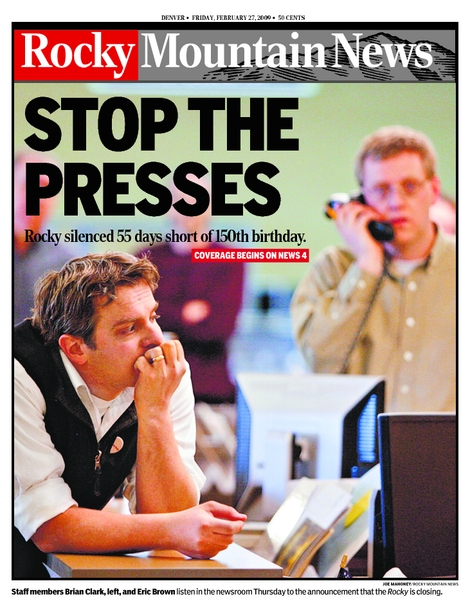
Dead-tree newspapers aren't cool. They don't update you on their status until they're about to close. And they may not care to use the crowd as a source because they know how to reach the experts. But what the daily rags have been doing for 200 years is keeping an eye on government and corporations like no other American institution. That could be cool again someday.
Our documentary, Stop the Presses: The American Newspaper in Peril, looks at how print journalism came to have this watchdog role, what went wrong and who might do that time- and money-consuming job in the future. It probably won't be traditional papers, which seem to be going out of business or filing for bankruptcy daily. Just this week, that includes The Philadelphia Inquirer, once the greatest investigative reporting machine in the land, and the Rocky Mountain News in Denver, no longer one of the few two-newspaper towns in America.
For the film, we traveled the country interviewing reporters and editors, journalism professors and students, media critics and readers. Our only assumption was that newspaper-style journalism was a bedrock of democracy. Paul Starr takes a similar tack in his comprehensive, thoughtful and well-documented article, "Goodbye to the Age of Newspapers (Hello to a New Era of Corruption)" in the March 4 New Republic:
One danger of reduced news coverage is to the integrity of government. It is not just a speculative proposition that corruption is more likely to flourish when those in power have less reason to fear exposure...
In a study published in 2003 in The Journal of Law, Economics, and Organization, Alicia Adsera, Carles Boix, and Mark Payne examine the relationship between corruption and "free circulation of daily newspapers per person" (a measure of both news circulation and freedom of the press). Controlling for economic development, type of legal system, and other factors, they find a very strong association: the lower the free circulation of newspapers in a country, the higher it stands on the corruption index...
Another analysis published in 2006, a historical account by the economists Matthew Gentzkow, Edward L. Glaeser, and Claudia Goldin, suggests that the growth of a more information-oriented press may have been a factor in reducing government corruption in the United States between the Gilded Age and the Progressive Era.
When we were making Stop the Presses, we had no idea things would get this bad this fast. But like Detroit, an industry that was hurting financially before the recession is in even greater trouble now.
Besides Denver and Philly, daily papers in San Francisco and Seattle are on the verge of closing; the Tribune Co., owner of the Los Angeles Times and Chicago Tribune, is just the biggest of several news organization to file for Chapter 11 bankruptcy protection this year; The Newark Star-Ledger has let go almost half its newsroom staff, and The Dallas Morning News, whose 2006 buyouts inspired Stop the Presses, is about to have its second round of layoffs since last fall.
So what, you say, good riddance to the mainstream media. They did this to themselves. It's a brave new world of Tweets out there. Talking Points Memo and Pro Publica and the Huffington Post will take up the slack. All that may be true to varying degrees. The Huffington Post functions well as a primary news source because it looks and reads like a newspaper on steroids and has the ability to aggregate stories from an unlimited number of news organizations.
But what can't be overlooked is that there's no business model to replace the advertising that funded the kind of in-depth and investigative reporting that allowed, for instance, Dana Priest and Anne Hull to spend four months uncovering the mistreatment of returning soldiers at Walter Reed. What will the Post and Google News and the Drudge Report aggregate after newspapers are gone?
Some of it may be paid for by philanthropists, and some of the formerly professional work may be conducted by citizen journalists. But before we celebrate or turn a blind eye to the demise of the American newspaper, let's take a moment to admit what we're losing.